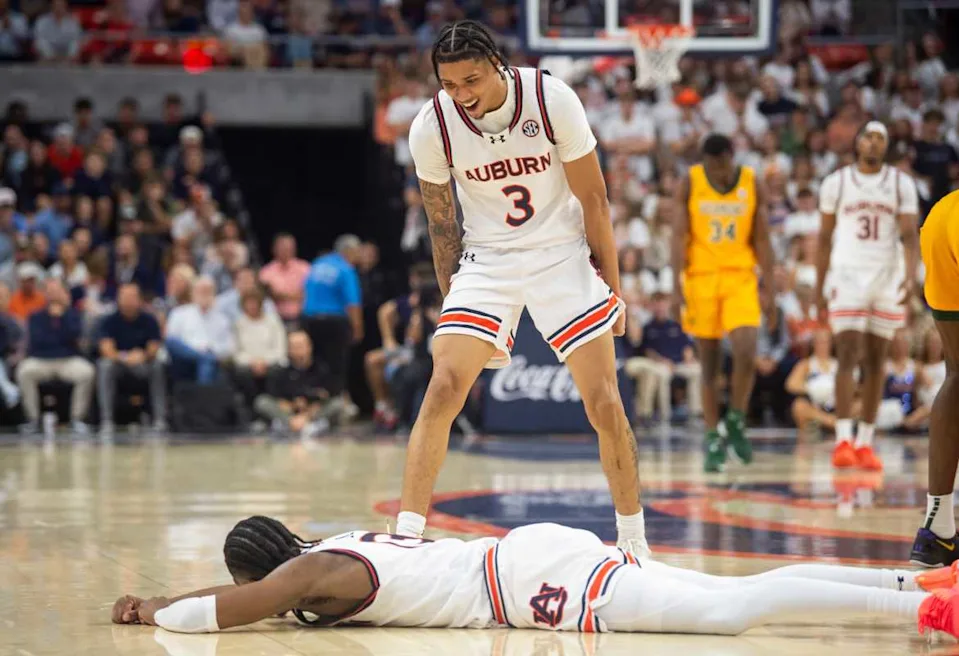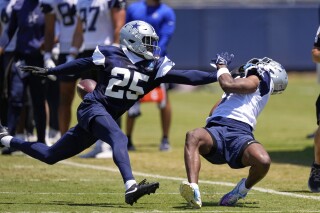The ever-shifting landscape of college football recruiting has added yet another surprising twist, as former Auburn Tigers four-star commit Malik Henderson has officially pledged to a Big 12 program, marking a pivotal moment not only in his own career but in the ongoing chess match of conference power dynamics. Henderson, a standout cornerback from Buford, Georgia, had once been viewed as a long-term building block for Auburn’s secondary. His commitment to the Tigers brought a sense of stability to a defensive backfield that was in the midst of a transitional phase under new leadership. Now, that vision has changed—and dramatically so.
When Henderson first committed to Auburn nearly a year ago, it was heralded as a significant win for the program. Standing 6-foot-1 and weighing in at a sturdy 185 pounds, Henderson possessed the physical tools and football IQ that made him a coveted prospect on the recruiting trail. His instincts in zone coverage, ability to play press-man at the line of scrimmage, and closing speed set him apart from most high school defensive backs in the Southeast. Auburn beat out the likes of Florida, LSU, and Tennessee for his services—no small feat considering the recruiting battles the Tigers have faced in recent years.
But as is often the case in college football, things changed. Henderson began to reevaluate his situation following Auburn’s underwhelming performance on the field last season. A program once rich in swagger and championship aspirations found itself searching for identity amid coaching inconsistencies, offensive sputters, and a defense that, while talented, struggled to stay consistent. There were whispers that Henderson wasn’t thrilled with the trajectory of the team, and following Auburn’s loss to in-state rival Alabama in the Iron Bowl—a game that saw the Tigers give up multiple big plays in the passing game—those whispers became a low roar.
Soon after the conclusion of the regular season, Henderson quietly reopened his recruitment. While he didn’t make a big announcement on social media or go through a long decommitment note like some prospects, word leaked to the recruiting media that he was having second thoughts. Within weeks, his name began circulating in connection with multiple programs across the country, including schools in the SEC, ACC, and Big Ten. But it was a particular Big 12 school that emerged as the surprise frontrunner: TCU.
At first glance, the Horned Frogs may not have seemed like an obvious destination for Henderson. But peel back the layers, and the fit makes perfect sense. TCU head coach Sonny Dykes has made it clear that the program intends to compete for conference titles and a place in the College Football Playoff. With the Big 12 entering a new era after the departures of Texas and Oklahoma, schools like TCU see an opportunity to become the new face of the league. And to do that, they need elite talent—especially on defense, where Big 12 games are often decided in the secondary.
TCU’s defensive backs coach Paul Gonzalez played a major role in Henderson’s recruitment down the stretch. Sources close to Henderson’s family say Gonzalez formed a tight relationship with both Malik and his parents, focusing not just on football but on personal development, academic resources, and future career planning. That attention to detail stood out, especially when compared to the more hands-off approach Henderson felt he was getting from Auburn’s staff in the final months of his commitment.
After an official visit to Fort Worth, Henderson was sold. He was impressed with the campus, the facilities, and the emphasis on player development. The Horned Frogs didn’t promise him early playing time, but they did promise a fair shot, a strong support system, and a clear vision for how he could be utilized in their defense. The result? A flip that caught much of the recruiting world off guard—but one that may prove to be among the most significant of this cycle.
Henderson’s commitment to TCU sends a clear message: the Big 12 is still a major player in national recruiting, even with traditional powers shifting elsewhere. His decision reflects a growing trend of blue-chip recruits looking beyond just the name brands and choosing schools based on scheme fit, opportunity, and coaching stability. And for Henderson, TCU checks all the boxes.
The ripple effects of his flip are being felt across multiple levels. For Auburn, it’s another recruiting loss that stings in the short term. The Tigers have done a decent job stacking depth in their defensive backfield, but Henderson was viewed internally as someone who could’ve made an immediate impact in nickel or dime packages. His departure leaves a hole—not just in terms of talent, but in the messaging Auburn has been trying to send about building a roster that can compete in the rugged SEC. Losing a four-star, in-state-region commit to a program outside the conference, especially this late in the process, isn’t just a loss on paper—it’s a blow to momentum.
On the other hand, for TCU, it’s a major victory. Henderson joins a class that already features multiple four-star defensive players and positions the Horned Frogs as one of the best defensive recruiting groups in the conference. His commitment could also serve as a magnet for other prospects. Several players in Henderson’s 7-on-7 and high school circles are still uncommitted, and his decision could influence their own thought processes as they weigh their options. Momentum is real in college football, and right now, it’s wearing purple and black.
From a pure football standpoint, Henderson’s fit in the TCU defense is intriguing. The Horned Frogs run a 3-3-5 base scheme that puts a heavy emphasis on hybrid defenders who can cover, tackle in space, and support the run. Henderson thrives in these areas. He has long arms, quick hips, and a physical nature that allows him to line up against taller receivers on the boundary or shift inside to cover smaller, quicker slot receivers. In high school, he regularly took on the other team’s best weapon—and more often than not, he won that battle.
What separates Henderson from most corners his age is his discipline. While many defensive backs are overly aggressive, Henderson plays with a veteran-like patience. He doesn’t bite on double moves. He rarely gets caught looking in the backfield. And when the ball is in the air, he plays through the hands of the receiver like a technician. That kind of polish, combined with his athleticism, makes him an ideal fit for TCU’s defense.
Recruiting experts are already praising the move. Rivals called it “one of the most strategic flips of the spring,” while 247Sports elevated TCU’s class ranking as a result of Henderson’s decision. ESPN recruiting analyst Tom Luginbill went a step further, saying Henderson could be a “day one contributor” and “an All-Big 12 performer by year two if he stays healthy.”
But while all the attention is on what Henderson can bring to TCU, there’s also a larger story at play here—one about the changing nature of college football recruiting. It’s no longer just about geography or legacy. Today’s recruits are more informed, more empowered, and more willing to change their minds in search of the best personal fit. NIL opportunities, coaching connections, and developmental track records carry as much weight as tradition or brand. Henderson’s move is a reflection of that.
For now, Henderson is focused on finishing strong in the classroom and getting his body ready for the grind of college football. He’s expected to enroll early and participate in spring practices next year, giving him a head start on the playbook and the chance to earn trust in the locker room. Those close to him say he’s locked in and fully committed to the Horned Frogs—not just for football, but for the experience of being part of a program that believes in him.
Whether this turns out to be a career-defining decision remains to be seen. But one thing is certain: Malik Henderson’s flip from Auburn to TCU is about more than just one player. It’s about the ongoing battle for relevance, the power of belief, and the evolving identity of college football. And in that battle, TCU just scored a major win.



